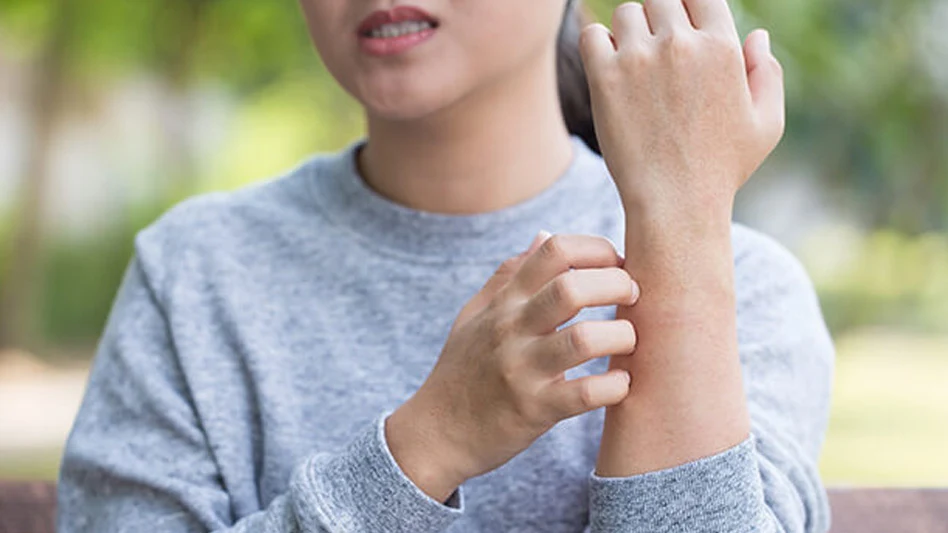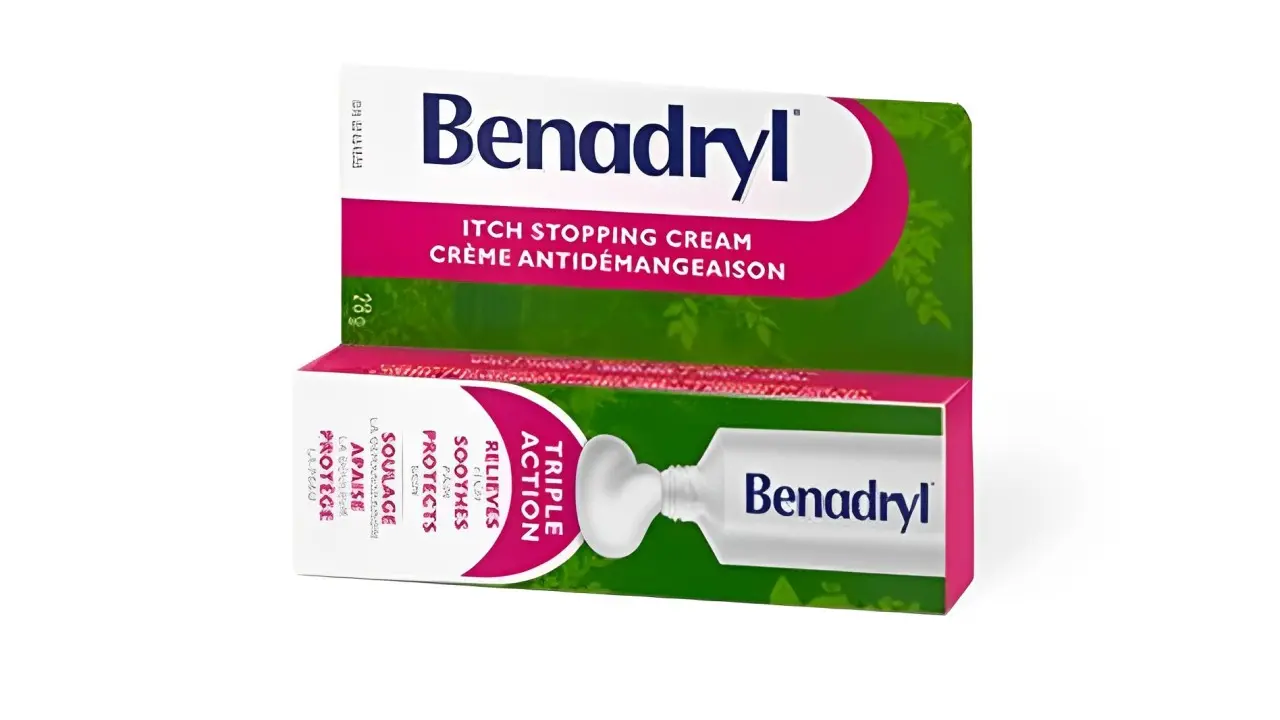What is causing me to scratch?
The skin is the body's largest organ. It acts as a barrier, protecting the inside of the body from particles, viruses, bacteria, and other pathogens. While some of these potential invaders can be seen with the naked eye, others are microscopic.1 When the skin comes in contact with a pathogen, it becomes irritated. This triggers a reaction that causes inflammation in the contacted area. This inflammation shows up as bumps, rashes, and redness. It can also cause itching.2
But did you know you can still experience a skin reaction even if the particle you’ve come in contact with is not actually harmful? Particles such as dander or pollen are typically harmless. However, when your body mistakes these particles as pathogens, your body triggers a skin reaction to protect itself. Your body can react to almost anything, including insect bites, insect stings, and sun exposure etc. These reactions are called allergy reactions.2
What are common skin allergy symptoms?
Skin allergy symptoms vary based on the type and the severity of the allergy. Most skin allergies can be broken down into three main categories: eczema, hives, and contact dermatitis.
Eczema
Eczema is a skin condition that normally appear in infants and children but can also last into adulthood or develop later in life. Although eczema rashes can appear on any part of the body, they are most common behind the knees and on the arms. The rash is usually textured (bumpy) and dry, as well as extremely itchy.3
Contact allergens such as wearing jewelry that’s not nickel free, or even wearing tight clothing on a hot day can trigger eczema.4
Hives
If you have hives, you may notice red bumps or welts on your skin. Hives can appear anywhere on the body, and they are usually itchy.5 Hives can be triggered by airborne allergens such as mold spores or pollen.6
Contact Dermatitis
Contact dermatitis is a condition that occurs when you come into contact with something that irritates your skin, such as a plant or laundry detergent. Symptoms include a rash that may include blisters. Contact dermatitis also causes itching and burning.7
Tips on Managing Itchy Skin Allergies
If you suffer from skin allergies and itching, try following these tips to for immediate and temporary relief:
Keep Scratches Clean: itchy skin can be tempting to scratch. But if you aren’t careful, you may end up bursting a blister or creating a wound with your nails. In either case, these open-wound scratches are dangerous because they can become infected without proper care. When you experience a wound due to scratching, be sure to clean and disinfect the area. Try to wash your hands before touching your scratches and keep your fingernails short to lower the risk of infection and irritation.8
Wear the right clothing: Some types of materials like wool or polyester can cause sweating and irritation, leading to an itch. Clothes made from cotton, bamboo or silk are known to be easier on the skin by being more breathable and softer while being ‘eczema-friendly’!9
Moisturize your skin: Keeping your skin well-moisturized can prevent dryness, which can exacerbate itching. 10 Using fragrance-free moisturizers can help restore the outer layer of your skin, maintaining its suppleness and protecting it from further irritation.11
Use a cold compress to relieve itch: If you are dealing with an itch that won't stop, consider using an ice pack or any gentle cooling agent (i.e. a cool washcloth). In many cases, cooling the skin will help reduce swelling and redness from scratching, and help bring temporary relief.12
Avoid scratching: this may seem like the hardest thing to do in the moment but try to avoid scratching your skin as much as possible. Scratching will only make the irritation worse. Scratching can also raise the risk of infection, inflammation, and scarring.10
Apart from the above home remedies, you can also use an over-the-counter medication. Consider Benadryl® as your Over-the-Counter (OTC) antihistamine solution for itchy skin allergies! Benadryl® is available in both topical and oral forms for both adults and kids. Some of the options available to specifically address itchy skin allergies, include: 13, 14
These allergy medications provide fast and effective relief from allergy and hay fever symptoms, including sneezing, itchy and runny nose, itchy eyes, watery eyes, hives, and insect bites.
Tips on Preventing Itchy Skin Allergies
If you are prone to skin allergies, taking steps to prevent these allergic reactions from occurring can drastically reduce your symptoms. Below are some tips to help you prevent skin allergies.
Keep your lawn short
Tall grass can release clingy grass pollens that may irritate your skin. To prevent allergic reaction to grass pollens, have someone to mow your lawn regularly and ensure all windows are closed during mowing.15
Avoid exposure to harsh sunlight or extreme temperature changes
Extreme temperature changes can be irritating to your skin. Harsh sunlight, for example, can cause heat rash or hives. If you have sensitive or delicate skin, avoid harsh conditions to reduce the risk of skin allergy symptoms.16
Wear sunscreen and body lotion suitable for sensitive or irritated skin
Using sunscreen protects your skin from harmful UV rays, while a lotion keeps it moisturized. However, if you have skin allergies, either of these products can lead to irritation. For the best results, use mild products specially formulated for sensitive skin.17
Use an insect repellant
If you are prone to developing skin allergy symptoms following insect bites or stings, use an insect repellant whenever you head outside to reduce your chances of getting bitten. Avoid damp areas outdoors that may be a breeding ground for insects, and steer clear from densely populated plants.18
Bathe with lukewarm water
Bathing with hot water can irritate your skin and make rashes or hives more inflamed. Bathe with lukewarm water and remember to scrub gently.16
Use fragrance-free products and avoid unnecessary direct contact with skin.
Products containing fragrance are often irritating to the skin and should be avoided if you develop any allergy symptoms. If you must use products or chemicals that contain fragrance, avoid direct contact with your skin as much as possible. For example, when spraying perfume, spray on your clothes instead of your bare neck or arms. When handling chemicals, use gloves to prevent direct contact.16
Although there is no sure way to avoid itchy skin, avoiding known allergens and harsh environments can help reduce your risk. But even when you’ve taken all precautions, itchy skin allergies are sometimes unavoidable. If you are dealing with skin-related allergy symptoms, you can find relief by taking over-the-counter medications like Benadryl®. As with any medication, it is always important to seek guidance from a doctor if your symptoms worsen or persist. Be sure to always follow instructions as directed on the label.

